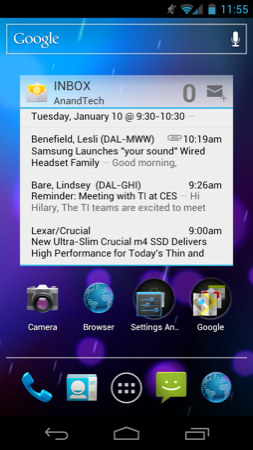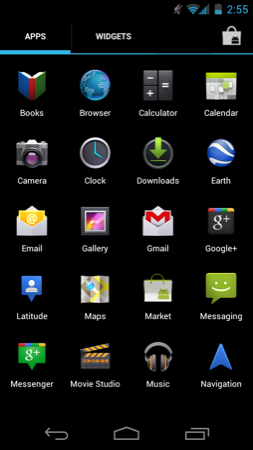Samsung Galaxy Nexus & Ice Cream Sandwich Review
by Brian Klug & Anand Lal Shimpi on January 18, 2012 1:34 PM ESTGoogle employs more than 20,000 people worldwide and the number of them working on Android are in the single digit percentage range. Google's business is search, but it has always had aspirations of more. Android isn't just a chance to capitalize on mobile search for Google, it's also an opportunity to grab power in the next era of personal computing. If you believe that smartphones will eventually replace mainstream PCs, who wouldn't want to be to smartphones what Microsoft was to PCs in the early 1990s?
Previous versions of Android have been cautious, evolutionary steps along a path to being a more open/flexible alternative to iOS. Starting with Honeycomb (Android 3.0) however, Google began to step out of the shadow of its competitors and really start to define Android as a mobile computing platform. Honeycomb was limited to tablets but its successor, Ice Cream Sandwich (Android 4.0), would bring unification to Android across both tablets and smartphones.
Today we look at both ICS and its launch vehicle, Google's Galaxy Nexus.
The Android vs. iOS Debate
It's very clear to me now more than ever that Apple and Google have completely different goals with their mobile OS strategies. Excluding the unclear strategy behind Chrome OS, Android is pretty much Google's primary operating system. The unified tablet/smartphone strategy behind Ice Cream Sandwich makes sense because for Google to succeed in the OS business it needs to deploy Android on everything from smartphones to notebooks. We've already seen the strengths in having a smartphone platform with a strong app ecosystem. Things become even more appealing if you have a phone, tablet and PC that all run the same OS and apps. As Android is Google's one-size-fits-all operating system, it needs to have a broader and slightly more ambitious focus than iOS otherwise it risks losing the race in the long run.
Apple is in a different position. It already has a successful desktop/notebook OS that is continuing to grow. While iOS has been a runaway success for Apple, the Mac OS X platform is a solid option for any user who needs more than their iPhone or iPad can provide. The two OSes may converge or at least borrow heavily from one another, but in the interim they can remain independent. If you need more of a computing experience Apple is happy to sell you a Mac. If you want the it-just-works appliance experience in your phone or tablet, Apple has a whole bunch of iPhone/iPad configurations to offer you.


ICS isn't a step towards iOS. If anything it proves that Google is committed to its own trajectory. Android is an OS that, although more closed than many would like, still allows more flexibility than iOS. You can sideload apps not purchased in the Market. The file system isn't completely hidden from you. You can even override the default zoom level on web pages. Apple and Google both pour tons of time and research into figuring out the best way to do something. And, to be honest, I feel like Apple generally does a better job of "getting it" for the very mainstream consumer. Rather than attempt to make the perfect mold however, Google gives you one that's a bit more flexible.
I've said this before but I do believe that Apple is trying to deliver more of an appliance experience, whereas Google is providing you with a modern take on a traditional computing experience. If the appliance is a smartphone, then both approaches are equally capable - it's just a matter of personal preference.
What's new in ICS really falls into one of three categories:
- Improvements in UI frame rate due to OpenGL ES rendering (non-skia) path
- UI tweaks
- New features
Nowhere in this list is a fundamental change in the way Android works. I feel that this is a very important point to understand and likely the cause for lots of disagreement when it comes to just how impressive (or not) ICS is.
ICS is smoother, more polished and has its own set of new features that make it a significant step forward for Android. What ICS is not however is an outright clone of iOS. If you prefer the iOS experience to Android, ICS will do nothing to change your opinion. If all you were missing from Android was a smoother UI, then its fourth major release should be almost everything you could ask for.










185 Comments
View All Comments
jamyryals - Thursday, January 19, 2012 - link
I liked this review very much. Do a video wrap up of the CES experience!HangFire - Thursday, January 19, 2012 - link
Anand,Are you using 2.2 era data for Thunderbolt battery life in the graph, or are you using modern Gingerbread data? The Thunderbolt has come a long way in managing battery life since introduction.
HF
Brian Klug - Thursday, January 19, 2012 - link
HF,Yeah, we're using the initial launch performance of the HTC Thunderbolt here. Unfortunately HTC wanted that phone back, so we can't test with the newer updates. This is one thing we're working on changing this year.
-Brian
lewchenko74 - Thursday, January 19, 2012 - link
I moved from an iphone 4 to the Galaxy Nexus... and there are issues that are not listed in this review.My only previous Android phone was a HTC Hero, which I rooted to 2.1 after no carrier support (Orange in the UK suck). Im happy with ICS in general.. but the phone itself has 2 really annoying major flaws which have happened to me on many occasion ...
1. The random turn off problem.
2. The random mic turning off mid call problem.
Both are discussed quite a bit on sites like androidcentral.com and xda-developers.com forums, and seem to be happening to MANY (see the forum pages yourself) people, whether you have a GSM version, US phone on all versions of ICS. Swapping out hardware for a different phone is not solving the problems, and whilst infrequent for me , they happen to other people far more. (and not at all to some people..)
In other words... Either ICS has a couple of critical bugs, or the hardware is at fault (or the firmware)..
Both issues are apparently acknowledged by google as well.... yet seem to be getting little to no publicity. BGR.com recently reported the random turn off problem with the Nexus.
So well done on the thorough review, but I wish somebody had warned me about these issues.
I dont regret switching from the iphone 4 (screen was too small, and the lack of customisation was frustrating.. and the 4s was such a major dissapointment)... the Galaxy Nexus is a phone with serious problems (hopefuly ones that can be resolved with updates).
Links to the forum pages of the issues :
http://code.google.com/p/android/issues/detail?id=...
http://forum.xda-developers.com/showthread.php?t=1...
http://forum.xda-developers.com/showthread.php?t=1...
http://forums.androidcentral.com/samsung-galaxy-ne...
B3an - Thursday, January 19, 2012 - link
These both seem like a very common issue. Pretty serious problems too, not exactly something small. Disappointing to see no mention of this in the article.anandtech pirate - Thursday, January 19, 2012 - link
really? you guys, a tech site, uploaded a 480p quality video in 2012? sigh....tipoo - Friday, January 20, 2012 - link
Ah yes, if I can't see every follicle in his beard the review loses all its informativeness! lolNevod - Friday, January 20, 2012 - link
Very weird battery life measurements.Judging by Wi-Fi hotspot and Talk time, Wi-Fi and cellular basebands are comparable in efficiency to other modern devices. Advantage over SGSII seems to be proportional to battery.
Cellular web browsing time is quite good. Yet so low Wi-Fi browsing time - looks like it goes into some "hunger mode", like not caching anything when on Wi-Fi.
Also, there is an option in ICS browser to invert colors, switches black and white , probably to extend battery life on OLED screens, as, well, sites usually have white backgrounds and that's not very nice to battery. Would be interesting to see tests of battery performance on inverted colors.
Bytales - Friday, January 20, 2012 - link
Please Anandtech, if you have the posibillity, make a review of Galaxy NoteArtifex28 - Friday, January 20, 2012 - link
You should use some curtains to kill the early reflections from concrete walls. :)